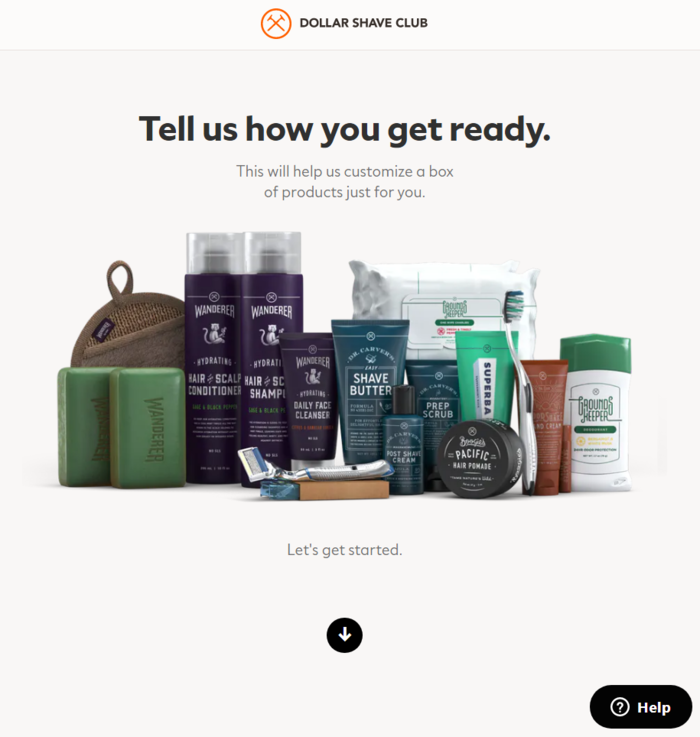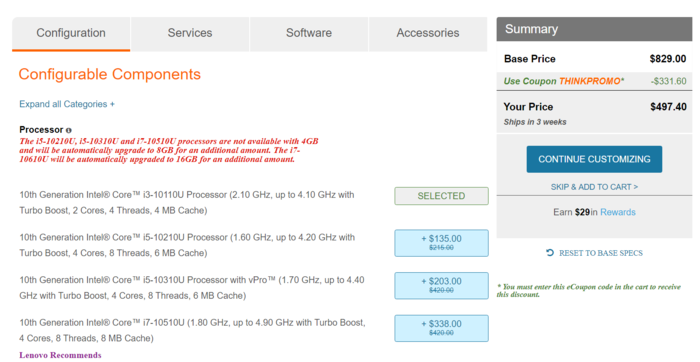
In today’s global marketplace, it’s a great time to be a consumer. The rise of e-commerce means more and more businesses are striving to get the consumer’s attention, offering better prices and services just to keep them interested. With online sales representing 16 percent of total retail ad spend, business owners don’t want to leave money on the table.
The smartest business owners know that the only way to consistently beat the competition is by offering more value to customers.
However, if everyone in my industry is selling the same products, at the same price, how can I stay competitive? The answer: Create memorable experiences.
If you’re looking for a unique way to offer value to consumers, customized products can be a powerful, engaging tool that improves customer satisfaction and drives up conversions in the process.
What Are Customized Products?
Customized products exist as a way for consumers to customize their purchases and walk away with a unique brand experience.
Examples include:
- Nissan letting consumers design their own cars, right down to the engine color
- Lenovo allowing customers to build their own custom laptops
- Build-A-Bear Workshop focusing on unique customization from the ground up
These examples showcase the importance of offering customization and customization.
It’s not just a theory. Epsilon’s research found that 80% of consumers are more likely to make a purchase when brands offer customized experiences.
The concept of customization was designed just a few decades ago to promote exclusivity. Customized products were a status symbol, a vehicle to make consumers with massive budgets feel special.
Although that’s still the case with certain products (exotic cars and designer handbags, for example), rapid advances in technology have made mass-customization a possibility for everyone.
Still, despite the lowered barrier to entry, product customization maintains a certain allure to consumers. This begs the question: If the key component of customized products is no longer there (the exclusive status symbol), then why are consumers still so interested?
The answer is actually pretty straightforward: Businesses were operating with a fundamental misunderstanding of what made customization so appealing in the first place.
Reasons Your Company Should Offer Customized Products
What massive brands around the world have figured out, and what e-commerce business owners need to understand, is that exclusivity was only a small piece of the puzzle.
Product customization can have a massive impact on customer satisfaction, and by extension, your e-commerce business’s success. Why? Because not all of your customers want to experience your product in the same way.
Think about it. When it comes to something like marketing, we understand that different customers have different needs. The first-time visitor to your site needs a different call-to-action than the customer with the abandoned shopping cart. Customized customer experiences are nothing new, it’s just time that e-commerce businesses started to expand their customization horizons.
Where things get really interesting for me is when you start considering the potential financial value this brings to companies all over the world. Let’s not ignore the fact that 91% of consumers are more likely to shop with brands that provide relevant offers and recommendations. More specifically, it puts business owners in a win-win scenario.
When you offer dozens of different variants and options to users, you’re creating a more inclusive marketplace, and different consumers with unique priorities can still walk away with something they like.
Even more interesting is the capacity for testing. You don’t need to make everything in your store customizable. Instead, you can test for specific features and determine the ones that people love.
Over time, business owners can collect data and use this information to build product offerings that their customers are statistically more interested in. More value for consumers, more value for the business. Win-win.
Understand What’s Driving the Popularity of Customized Products
The benefits of customized products are pretty easy to measure. When a consumer can personalize a purchase, it gives them a chance to “stand out” and be distinctive.
Let’s use the example of a custom T-shirt. On the surface, it seems like customers are simply modifying something to maximize the value of that product. In reality, the experience is a bit more layered.
For the sake of analysis, let’s break down a study conducted by the Journal of Information Technology Management.
We’ve established that customizing products brings consumers a certain level of enjoyment. We can view “Enjoyment” as the umbrella category.
Within that category, there are two subcategories of enjoyment. On one hand, there’s “Use Enjoyment” and “Design Enjoyment.” Certain customers will fall into certain categories, depending on what they value in particular.
Each of those subcategories had its own subdivisions.
Consumers who fell in the “Use Enjoyment” category either enjoyed the unique appearance of the item or enjoyed the functionalities of the item that fulfilled their unique needs. Consumers in the “Design Enjoyment” category either enjoyed innovating or enjoyed participating in the design process.
You can use this framework as a way to test what your consumers expect from your business, but the key lesson to keep in mind here is that product customization should be an engaging, exciting process for customers.
Examples of Customized Products
All of this can get a bit abstract, so let’s take a look at a tangible example. Here’s how Dollar Shave Club handles customization.
They start with some strong and clear copy, and with a single click, you’re building your custom Dollar Shave Club box.

From there, you’ll complete a quiz and come out on the other end with a straightforward recommendation and a strong call-to-action. Of course, you can further customize your options by scrolling down the page.
On the surface, this might look like just another way to sell their products. In reality, that’s only half the story. Every aspect of this quiz is designed to ensure that consumers are presented with a solution that accurately addresses their pain points.
Lenovo, on the other hand, actually lets you build out your dream laptop.
It’s important to keep the limitations in mind, of course. While the laptop would be customized, the capacity of the laptop is limited.
When creating your customized product offerings, remember that removing concerns about compatibility can make life much simpler for your consumer. Unless they’re particularly tech-savvy, they probably wouldn’t understand why certain components just don’t work together.

Alleviating friction before it becomes an issue is one of the many benefits that come from creating a rich customization experience.
Tips for Creating Customized Products
All of that looks and sounds great, but how on earth are you supposed to create customized products for your consumers? After all, offering 100+ options isn’t exactly budget-friendly.
Well, remember that consumers aren’t just interested in custom products. They want customized experiences. Most business owners already know this. It’s the reason so much time and money goes into marketing campaigns.
Focusing on customized experiences helps you develop a deeper relationship with your consumers. They can buy products anywhere, but your business is the only one that helps them customize their experience. Those better experiences lead to customer satisfaction, brand loyalty, and hopefully, repeat customers!
So, with that in mind, let’s take a look at some of the tools you can use to build tailor-made products and experiences.
Custom Fit
Whether you sell swimsuits, winter jackets, or everything in between, you understand that selling clothes online can be a customer satisfaction nightmare.
The biggest problem? Fit.
Everyone seems to have different definitions of small, medium, and large. While this can usually be fixed with a quick return and exchange, it tends to leave a bad taste in your customer’s mouth.
So rather than focusing on fixing the problem, let’s find a way to make sure it never happens again. Making it an engaging sales tool is just a bonus!
A Custom Fit quiz might seem simple but make no mistake: Making your customers feel more secure about their sizing choices means they’re more likely to purchase as possible sizing issues are avoided.
Customized Product Bundling
One of the most undervalued aspects of product customization is its potential for reducing friction.
When you offer to bundle an accessory with a particular product, you’re not just upselling to make some extra money on the sale. You’re addressing two possible customer pain points before they even arise.
Right off the bat, you’re making customers aware of the fact that a particular accessory is necessary to ensure they maximize their purchase. As a bonus, you’re able to confirm compatibility by clearly showing consumers which items they should pair together.
It’s a way to ensure that consumers walk away with everything they need after a single transaction. Further, it’s more than just a good sales tactic. It’s an effective, thorough customer satisfaction tactic.
Tips for Selling Customized Products
Maximizing your sales and profit margins is always going to be a priority, and every tactic here is designed to support that goal.
That being said, selling a consumer on the concept of customized products is less about actively selling and more about creating experiences that guide customers down the sales funnel with valuable information.
As far as I’m concerned, the best-customized experiences sell themselves. Of course, it helps if you’re building experiences that are so compelling and engaging that consumers can’t help but click the “Buy” button.
Use these tactics to drive conversions while still keeping the shopping experience engaging and personal.
Don’t Overcommit (Test the Waters)
All this talk of customized products might have you worried that you’ll need to spend tons of money on new inventory and be stocked up for potential buyers.
In reality, the process should start small. Unless you have a massive budget, your best bet is to test the waters and figure out what versions of products consumers are actively seeking.
If you’re experimenting with customizable T-shirt colors, you don’t need 50 new colors. Start with a few set colors, and give yourself plenty of lead time so you don’t have to rush production.
People aren’t interested in new colors? You can phase them out without worrying that you’ve let hundreds of dollars go to waste.
Customized Product Recommendations
We already discussed this a bit earlier, but the value of the customer quiz shouldn’t be understated.
Let’s say you frequently have website visitors that don’t have a well-defined shopping list yet. These are people who are just browsing and seeing what catches their eye.
Well, what if you could guide that person towards a sale, while also providing them with value in an engaging way? Sounds like a great way to kick-start your relationship, if you ask me. Keep in mind that 90% of consumers are willing to share their behavioral data if it’ll make their shopping easier.
By creating a simple quiz and offering customized product recommendations, you can accomplish so much.
For starters, customers will walk away with a much clearer understanding of their needs. They’ll also associate you with industry authority since your business showcased your know-how and expertise.
Beyond that, your consumers are one step closer to making a purchase through your site. All thanks to a simple, two-minute quiz.
Conclusion
Customized products are often seen as some sort of gimmick, a cheap way to offer variety instead of value.
Interestingly enough, I’ve found that well-designed customized products offer an impressive amount of value to consumers.
Consumers can be empowered by a process that simplifies their shopping experience. Or they can walk away with a deeper understanding of what they need from your business.
As long as your customized e-commerce experience is compelling, engaging, and generally value-driven, you can be optimistic that you’re enhancing your customer’s shopping experience and by extension, increasing your chances of making a sale.
What kind of customized products do you think offer the most value? Let me know in the comments below!
The post Why You Should Consider Selling Customized Products appeared first on Neil Patel.
About us and this blog
We are a digital marketing company with a focus on helping our customers achieve great results across several key areas.
Request a free quote
We offer professional SEO services that help websites increase their organic search score drastically in order to compete for the highest rankings even when it comes to highly competitive keywords.
Subscribe to our newsletter!
More from our blog
See all postsRecent Posts
- Web Hosting September 26, 2023
- Affiliate Management September 26, 2023
- Online Presence Analysis September 26, 2023

